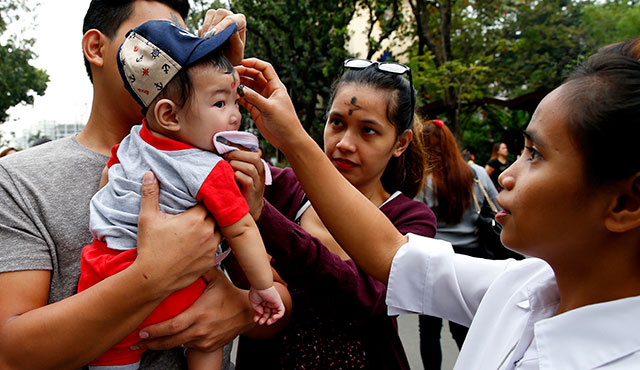In his message for Lent, Pope Francis calls on Catholics to be aware of “false prophets” and “cold hearts.”
“…the Church, our Mother and Teacher, along with the often bitter medicine of the truth, offers us in the Lenten season the soothing remedy of prayer, almsgiving and fasting,” he wrote.
The three remedies he recommends are ancient, but thriving traditions that help Christians grow through their Lenten journey. However, for some fasting may be the most challenging of the three.
“Fasting weakens our tendency to violence; it disarms us and becomes an important opportunity for growth. On the one hand, it allows us to experience what the destitute and the starving have to endure. On the other hand, it expresses our own spiritual hunger and thirst for life in God. Fasting wakes us up. It makes us more attentive to God and our neighbor. It revives our desire to obey God, who alone is capable of satisfying our hunger,” the Pope writes.
For Catholics, Ash Wednesday and Good Friday are obligatory days of fasting and abstinence. Fridays during Lent are also obligatory days of abstinence. The Church also encourages, if possible, that the fast on Good Friday continue until the Easter Vigil on Holy Saturday night. Referred to as the “paschal fast,” fasting honors the suffering and death of Christ and prepares Catholics to share more fully and unite in his Resurrection.
The United States Conference of Catholic Bishops (USCCB) gives us these guidelines for the penitential practices:
“For members of the Latin Catholic Church, the norms on fasting are obligatory from age 18 until age 59. When fasting, a person is permitted to eat one full meal, as well as two smaller meals that together are not equal to a full meal. The norms concerning abstinence from meat are binding upon members of the Latin Catholic Church from age 14 onwards.”
In addition, Catholics who are either physically or mentally ill, suffering from chronic illnesses such as diabetes, or pregnant and nursing women are excused from fasting.
The USCCB also further explains what is considered as a meat product. Chickens, cows, sheep, pigs and birds are all considered meat. Abstinence does not include meat juices and liquid foods made from meat. Additionally, salt and freshwater species of fish, amphibians, reptiles, cold-blooded animals and shellfish are also not forbidden.
Fasting and abstinence can also involve giving up certain things or doing things a person normally wouldn’t do. These sacrifices can be recommended to children who haven’t reached the age of fasting obligations so that they can also experience the richness of the Lenten process. Some examples involve giving up TV, digital devices or simply candy. Although not regulated by the Church, it is recommended that these sacrifices are effective if they are done continuously throughout Lent and not just on Fridays.
Deacon Steve Greco, who serves at St. Elizabeth Ann Seton Parish in Irvine and also founder and president of Spirit-Filled Ministry, recognizes that prayer and fasting go hand in hand.
“A big part of Lent is deeper prayer and so before we enter into a fast we should have a communication with God through prayer and ask ‘what is going to help me the most spiritually?’ So giving something up without confirmation from the Lord is not going to be as helpful,” he said.
Prayer provides an opportunity to reflect on sin, recognize our failings and experience a desire to change and forgive. The fast a person chooses to do should also be between the person and God, performed without complaint and with little show.
Beyond the rules and guidelines of fasting exists a deeper, richer and fulfilling meaning for Catholics.
“Catholics fast during Lent in order to get closer to God and one of the most important aspects of Lent is to take a spiritual inventory as to what is keeping us from having a closer relationship with Christ,” said Deacon Steve Greco. “When we fast, we clear ourselves of clutter. We become spiritually more attune to listen to God.”
In an article written by Rev. Daniel Merz, “A Reflection on Lenten Fasting,” he offers at least seven reasons on how Christians benefit from this penitential practice:
- From the beginning, God commanded some fasting, and sin entered into the world because Adam and Eve broke the fast.
- For the Christian, fasting is ultimately about fasting from sin.
- Fasting reveals our dependence on God and not the resources of this world.
- Fasting is an ancient way of preparing for the Eucharist – the truest of foods.
- Fasting is preparation for baptism (and all the sacraments) – for the reception of grace.
- Fasting is a means of saving resources to give to the poor.
- Fasting is a means of self-discipline, chastity and the restraining of the appetites.

